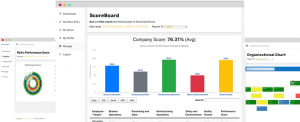Performance Scoring Reviews: Aaron Schaffer’s Article on Continuous Performance Management
In his recent TechSpective article, “Continuous Performance Management Will Enhance Your Business,” Aaron Schaffer details three key benefits to continuous performance management processes for businesses. Schaffer begins by acknowledging that “annual reviews appear to have virtually no impact on employee performance,” citing an Inc. article. “The fact that it’s time to say goodbye to the annual performance review is just another shift in the modern workforce,” continues Schaffer. With continuous performance management being the consensus step towards modernization, Schaffer discusses three enhancements the process brings to an organization.
1- Encouraging Regular Communication
Many would argue that there is no such thing as too much communication, great continuous performance management keeps communication channels always open. The process “involves using technology to facilitate regular check-ins between managers and employees,” Schaffer writes. Technology, like Performance Scoring, implements automated notifications as a baseline to regular communication. This makes it “easier for management to offer valuable feedback on a consistent basis,” rather than sporadically or at an annual performance review. Furthermore, “this has been shown to boost engagement (and, as a result, productivity),” making it a win-win for management and employees.
2- Providing Holistic Assessments
Continuous performance management “allows managers to efficiently collect feedback and information from various sources.” Employees interact, and are dependent on, other employees and departments in their job duties. “Being able to gather insights from an employee’s coworkers results in a more holistic picture of a worker’s strengths and weaknesses,” notes Schaffer. Peer-to-peer feedback, when done effectively, is viewed more favorably by employees. Performance Scoring’s continuous performance management system uses peer-to-peer feedback and supervisor-to-employee feedback to provide holistic assessments.
3- Gathering Data Regularly
One of the major shortcomings of annual performance reviews is they rely on a recency bias that employees by and large do not appreciate. When conducting annual reviews, “leaders often fail to provide a truly thorough account of an employee’s performance,” Schaffer adds. How could leaders be successful in providing thorough accounts on performance when the tools to do so have not existed? With a continuous process, “important points won’t be overlooked” and “improvements an employee has made are more likely to be recognized.” Data is the key to driving high-performance coaching, this is one leading differentiator (along with customization) that has made Performance Scoring so impactful to its clients.

Schaffer closes the article by stating that “continuous management is far more effective because it’s designed to meet the genuine needs of workers.” Performance Scoring as a continuous performance management platform was also designed to meet the genuine needs of management. Meeting the needs of workers and management, a win-win.




